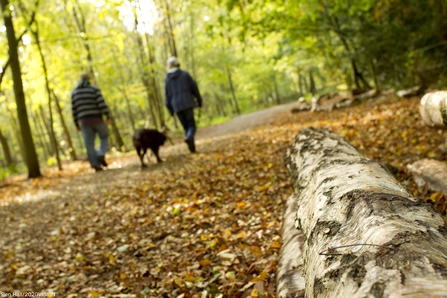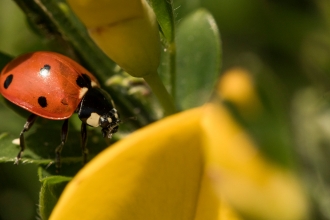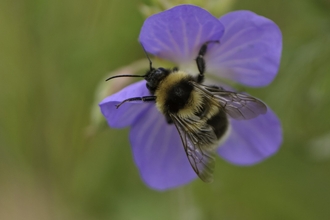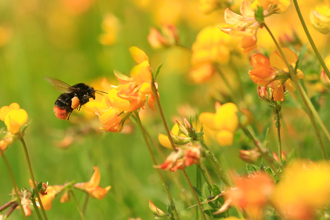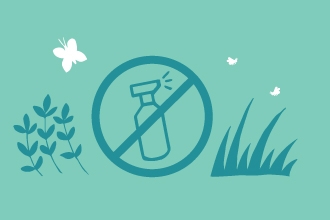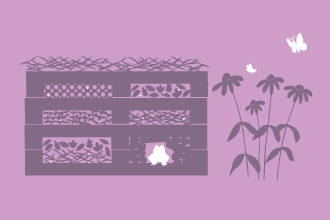Insect populations are declining at an alarming rate
41% of insect species face extinction. The loss of their habitats and overuse of pesticides are two major reasons why insects are dying out eight times faster than large mammals. We believe that reversing the decline of insects is possible if:
A network of nature-rich areas is created covering at least 30% of the UK, and legally binding targets are set for nature’s recovery which are monitored and enforced.
Local councils prioritise green recovery and create more nature-rich places where insects can thrive and make cities, towns and parishes pesticide-free.
Everyone steps up to become an insect champion.
You and your pets
As a nation of animal lovers, we feel the pressure to take care of our animals to the best of our ability. This often means pet insurance and regular flea treatment. Some flea treatments can be harmful to wildlife and our rivers, so we've got some tips on how you can protect animals at home and in the wild. Find out more.

WildNet - Jon Hawkins - Surrey Hills Photography
Victory for bees and pollinators
After five years of campaigning and thanks to public support we are delighted with this Government decision.
Wildlife Garden Award
Have you created a wildlife garden that is buzzing with insects? Devon Wildlife Trust's Wildlife Garden Award invites you to add your garden to the patchwork of wild spaces across Devon. It's easy to enter and you can receive your free plaque to display!
Are you a Local Authority?
Local Authorities can help support insect populations in urban areas. To help councils start taking action for insects, The Wildlife Trusts have put together some easy, often cost-saving, actions that Local Authorities can take to help insects and other wildlife thrive. These actions range from policy changes to more practical solutions and public engagement.
Help bring insects back from the brink!
Further reading on insect decline
A report, Insect Declines and Why They Matter, published in November 2019 by an alliance of Wildlife Trusts in the south-west, brought together evidence that showed the loss of 50% or more of our insects since 1970, and the shocking reality that 41% of the Earth's remaining five million insect species are now 'threatened with extinction'.
In 2020, The Wildlife Trust's published a second report ‘Reversing the Decline of Insects’ shows how people, in every part of society, wherever they live, can take action to bring back insects. Everyone, everywhere, is being asked to become an insect champion. The report cites examples of farmers, communities, councils and charities that are boosting insect populations and proving that it can be done.
The Wildlife Trusts are calling on the new UK Government to halve pesticide use
The catastrophic decline of insects is having a huge effect on the rest of the natural world. Insects are the canaries in the coal mine – their collapse is an alarm bell that must not be ignored. To save the future of insects – and all life that depends on them – the new UK Government must halve pesticide use by 2030 and maintain all bans on of bee-killing and human-health-harming neonicotinoids once and for all.
Don’t farmers need pesticides to grow enough food?
In many parts of Britain, traditional family farms have given way to large agri-businesses, typified by large fields, often managed by external contractors, maintained as near perfect monocultures by high inputs of pesticides and fertilizers.
The result is a landscape that produces more food, more cheaply, than it used to, but is largely inhospitable to wildlife and provides employment for very few people. The low price of food on the supermarket shelves that we have become used to does not reflect the true environmental costs of its production. It is also important to note that farmers only receive a fraction of the retail sale price of food, so the cost of improved on-farm practice would have a relatively small impact on shoppers.
Recent studies from France estimate that total pesticide use can be reduced by 42% without significant reductions to yield or profit
France is one of the biggest consumers of pesticides in Europe (per unit of agricultural area). In 2013, after controversy over levels of pesticide concentration in drinking water, the French government set a target of a 50% decrease in pesticide use, promoting the principles of agroecology and advocating integrated management of pests for a reduction of pesticide reliance.
Food security and economic impacts were a major consideration for policy advisors and researchers:
“We demonstrated that low pesticide use rarely decreases productivity and profitability in arable farms. We analysed the potential conflicts between pesticide use and productivity or profitability with data from 946 non-organic arable commercial farms showing contrasting levels of pesticide use and covering a wide range of production situations in France. We failed to detect any conflict between low pesticide use and both high productivity and high profitability in 77% of the farms.” Lechenet et al. 2017
How do I stop my plants and vegetables being eaten if I don’t use pesticides in my garden?
Gardening without harmful chemicals is a good way to ensure that the food and plants you grow are pesticide free and can still thrive without using products that are harmful to our wildlife. If you’ve used chemicals in the past, this might sound like an invitation to every pest for miles around to shred your garden ... and that might well happen at first. But, with time and patience, you’ll end up with a rewarding, healthier garden for ditching the chemicals.
Spraying to deal with pests can often kill the predators too, or at least make them want to avoid your garden. When you stop using chemicals, aphids are the first creatures to return as they have a short breeding cycle. Their predators may take longer to come back, but stick with it and know it will be better in the long run! Our Action for Insects for the home has lots of advice and tips for how you can garden without chemicals including advice on companion planting and alternatives to chemicals.
In the end you’ll wonder why you ever needed chemicals in the first place.
We can’t turn the clock back to how things used to be so what can we do today?
We can turn our cities, towns, villages and gardens into a buzzing network of insect-friendly habitats. We have about ½ million hectares of gardens in the UK, plus city parks and green spaces, school playing fields, railway embankments and cuttings, road verges and roundabouts; if managed favourably, and if we avoid pesticide use these areas could go a long way towards creating a national ‘Nature Recovery Network’.
250,000 miles of road verges. More could be managed for wildlife by sowing insect friendly seed mixes, mowing later in the year, and removing the cuttings. Green bridges should be a part of transport infrastructure projects.
430,000 hectares of gardens. Wildflowers in gardens have huge potential to help pollinators such as bees. A network of small patches could help bees thrive in urban areas.
52 million people. 80% of the UK’s population live in urban areas. New parks, street trees, green roofs and walls are an important way to help everyone experience nature in daily life.
Our public spaces. Two thirds of amenity land is short mown grass, but meadow habitats support eight times more wildlife. Just allowing more flower species in the grass, and mowing some areas less frequently has been shown to be of huge benefit to insects. Greener and more biodiverse neighbourhoods provide health and wellbeing benefits for people.
Our farmland. 70% of UK land is farmland, so making our farms more wildlife friendly and sustainable is vital



